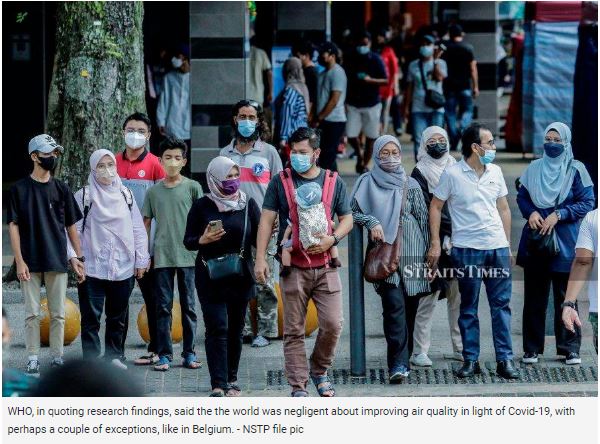Good ventilation can combat Covid-19
Emeritus Professor Tan Sri Dato' Dzulkifli Abdul Razak
Opinion - New Straits Times
July 5, 2022
Talk on vaccination and booster dose is back, thanks to influenza-like illness outbreaks in some states, especially in schools and educational institutions.
Respiratory infections such as influenza can add more risks to people's health problems, not forgetting the Omicron (sub)variants making their rounds.
Death rates in some countries are reported to be on the rise again.
And an Omicron-specific jab is said to be in the offing.
The World Health Organisation (WHO) has sounded a warning that the pandemic is far from over.
To let our guard down may be ill-advised when the pandemic is still very much in the air.
Speaking about "air", WHO has also spoken about issues regarding ventilation, regarded as a public health action yet to be embraced globally.
WHO said the world was still not using one of its most effective weapons against Covid: properly ventilating public spaces.
There is now a "fragile, armed peace" with Covid-19.
"In the hopes of stemming the tide of the pandemic and reducing mortality, we need to reduce the level of contamination, which the vaccine cannot do alone," the Institute of Global Health director at the University of Geneva was quoted as saying.
"We need a new phase — improving the quality of indoor air," he added.
The spread of the pandemic depends on the quality of air, especially in indoor spaces, in private and public dwellings.
These include galleries, malls, schools and public transport, where physical distancing is easily compromised and the non-use of face masks is often taken for granted.
So too with respect to maintaining cleanliness and sanitation.
In other words, under those circumstances, the "exchange" of Covid-19-infested air is more prevalent.
In research published by the British Medical Journal, it was found that people can infect each other when they are more than 2m apart.
So in a well-ventilated area, a more rapid dissipation of the virus-carrying aerosol in the air can be expected like in smoked-filled rooms.
In other words, to protect the population from Covid-19 is to ensure that all shared spaces are fully ventilated.
Also, we should refrain from re-circulating "used" air without refreshing, or worse, without filtering it.
Unfortunately, these readily implementable practices are not taken up or even discussed as a matter of policy, as noted by WHO.
WHO, in quoting research findings, said the the world was negligent about improving air quality in light of Covid-19, with perhaps a couple of exceptions, like in Belgium.
The country has allegedly announced a plan to place a carbon dioxide meter in public places, voluntarily until the end of 2024, and it becomes mandatory after that.
Malaysia has yet to do something similar. Generally, in developing countries, it should be given priority.
Ensuring adequate ventilation is doable and preferable.
It could even lead to an improvement in our quality of life whereby the use of air-conditioning is strictly controlled
Overall, issues related to climate change and global warming will be addressed as part of a sustainable lifestyle.
The writer, an NST columnist for more than 20 years, is International Islamic University Malaysia rector
The views expressed in this article are the author's own and do not necessarily reflect those of the New Straits Times

